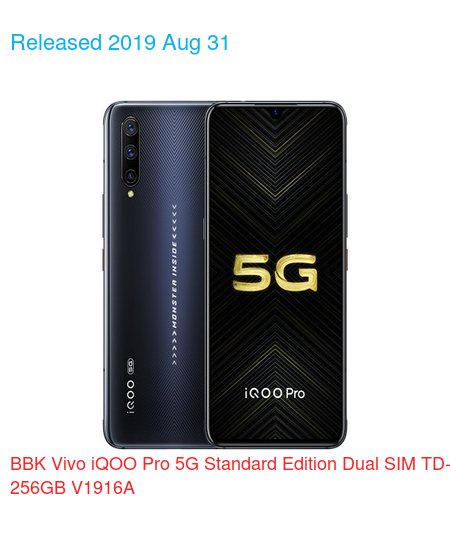| Brand | BBK |
| Model | Vivo iQOO Pro 5G Standard Edition Dual SIM TD-LTE CN 256GB V1916A |
| Released | 2019 Aug 31 |
| Announced | 2019 Aug 26 |
| Hardware Designer | BBK Electronics |
| Manufacturer | BBK Electronics |
| Codename | BBK V1916 |
| General Extras | Haptic touch feedback , Tactile touch feedback |
| Device Category | Smartphone |
| Width | 75.73 mm |
| Height | 158.73 mm |
| Depth | 9.325 mm |
| Dimensions | 2.98×6.25×0.37 inches |
| Mass | 215 g |
| Platform | Android |
| Operating System | Google Android 9.0 (Pie) |
| Software Extras | Voice Command , Navigation software , Augmented Reality (AR) , Intelligent personal assistant , Face Recognition |
| CPU Clock | 2956 MHz |
| CPU | Qualcomm Snapdragon 855+ SM8150-AC (Hana), 2019, 64 bit, octa-core, 64 Kbyte I-Cache, 64 Kbyte D-Cache, 1792 Kbyte L2, 2048 Kbyte L3, 7 nm, Qualcomm Adreno 640 GPU |
| RAM Type | LPDDR4x SDRAM |
| RAM Capacity (converted) | 8 GiB RAM |
| Non-volatile Memory Interface | UFS 3.0 |
| Non-volatile Memory Capacity (converted) | 256 GB ROM |
| Display Notch | 1-notch |
| Display Diagonal | 162.81 mm |
| Resolution | 1080×2340 |
| Horizontal Full Bezel Width | 7.5 mm |
| Display Area Utilization | 83.9% |
| Pixel Density | 402 PPI |
| Display Type | AM-OLED display |
| Display Subtype | Super AM-OLED |
| Number of Display Scales | 1073.7M |
| Scratch Resistant Screen | Yes |
| Graphical Controller | Qualcomm Adreno 640 |
| GPU Clock: | 672 MHz |
| A/V Out | No |
| Microphone(s) | stereo |
| Loudspeaker(s): | mono |
| Audio Output: | 3.5mm |
| Supported Cellular Bands | GSM850 , GSM900 , GSM1800 , GSM1900 , UMTS2100 (B1) , UMTS1900 (B2) , UMTS1700/2100 (B4) , UMTS850 (B5) , UMTS900 (B8) , CDMA800 (BC0) , TD-SCDMA2000 , TD-SCDMA1900 , LTE2100 (B1) , LTE1900 (B2) , LTE1800 (B3) , LTE1700/2100 (B4) , LTE850 (B5) , LTE900 (B8) , LTE700 (B12) , LTE700 (B17) , LTE800 (B18) , LTE800 (B19) , LTE800 (B20) , LTE1900 (B25) , LTE850 (B26) , TD-LTE2000 (B34) , TD-LTE2600 (B38) , TD-LTE1900 (B39) , TD-LTE2300 (B40) , TD-LTE2500 (B41) , TD-NR2500 (N41) , TD-NR3500 (N78) bands |
| Supported Cellular Data Links | GPRS , EDGE , UMTS , HSUPA , HSUPA 5.8 , HSDPA , HSPA+ 21.1 , HSPA+ 42.2 , DC-HSDPA 42.2 , cdmaOne , CDMA2000 1x , CDMA2000 1xEV-DO , CDMA2000 1xEV-DO Rev A , TD-SCDMA , TD-HSDPA , LTE , LTE 100/50 , LTE 150/50 , LTE 300/50 , LTE 600/50 , LTE 1000/100 , NR 2600 data links |
| SIM Card Slot | Nano-SIM (4FF) |
| Complementary Phone Services | Voice transmission , Voice speaker , Vibrate , Speakerphone , ANC , HD Voice , VoLTE |
| Dual Cellular Network Operation | Dual standby |
| Sec. Supported Cellular Networks: | GSM850 , GSM900 , GSM1800 , GSM1900 , UMTS2100 (B1) , UMTS1900 (B2) , UMTS1700/2100 (B4) , UMTS850 (B5) , UMTS900 (B8) , LTE2100 (B1) , LTE1900 (B2) , LTE1800 (B3) , LTE1700/2100 (B4) , LTE850 (B5) , LTE900 (B8) , LTE700 (B12) , LTE700 (B17) , LTE800 (B18) , LTE800 (B19) , LTE800 (B20) , LTE1900 (B25) , LTE850 (B26) , TD-LTE2000 (B34) , TD-LTE2600 (B38) , TD-LTE1900 (B39) , TD-LTE2300 (B40) , TD-LTE2500 (B41) |
| Sec. Supported Cellular Data Links: | GPRS , EDGE , UMTS , HSUPA , HSUPA 5.8 , HSDPA , HSPA+ 42.2 , DC-HSDPA 42.2 , LTE , LTE 100/50 , LTE 150/50 , LTE 300/50 , LTE 600/50 , LTE 1000/100 |
| Sec. SIM Card Slot | Nano-SIM (4FF) |
| Touchscreen Type | Capacitive multi-touch screen |
| Expansion Interfaces | No |
| USB | USB 2.0 |
| USB Services | USB charging , USB fast charging , USB Host , USB OTG 1.3 , USB OTG 2.0 , USB PD |
| USB Connector | USB C reversible |
| Max. Charging Power | 44.0 W |
| Bluetooth | Bluetooth 5.0 |
| Wireless LAN | 802.11a , 802.11b , 802.11g , 802.11n , 802.11ac |
| Wireless Services | Wi-Fi Direct , Wi-Fi Tethering , WiDi , Wi-Fi Calling |
| NFC | NFC A , NFC B |
| FM Radio Receiver | No |
| Complementary Satellite Services | Simultaneous GPS , A-GPS , Geotagging , QuickGPS , QZSS |
| Supported GLONASS protocol(s) | L1OF |
| Supported Galileo service(s) | E1 |
| Supported BeiDou system (BDS) | B1I BeiDou receiver |
| Camera Placement | Rear |
| Camera Image Sensor | CMOS |
| Image Sensor Pixel Size | 1.40 micrometer |
| Number of effective pixels | 12.2 MP camera |
| Aperture (W) | f/1.79 |
| Zoom | 1.0 x optical zoom |
| Focus | PD AF |
| Video Recording | 3840×2160 pixel |
| Flash | single LED |
| Camera Extra Functions | HDR photo , HDR video , Red-eye reduction , Slow motion video , Burst mode , Refocus , Touch focus , Panorama Photo , Face detection , Face tagging , Smile detection , Face retouch , Face retouch (video) , Intelligent scene detection |
| Aux. Camera Image Sensor | CMOS |
| Aux. Camera Number of Pixels | 13.0 MP aux. cam |
| Aux. Camera Aperture (W) | f/2.40 |
| Aux. Camera Extra Functions | HDR photo , HDR video , Burst mode , Macro mode |
| Aux. 2 Camera Image Sensor | CMOS |
| Aux. 2 Camera Number of Pixels | 1.9 MP aux. 2 cam |
| Aux. 2 Camera Aperture (W) | f/2.40 |
| Aux. 3 Camera Image Sensor | No |
| Aux. 4 Camera Image Sensor | No |
| Secondary Camera Placement | Front |
| Secondary Camera Sensor | CMOS |
| Secondary Camera Number of pixels | 12.2 MP sec. cam |
| Secondary Aperture (W) | f/2.00 |
| Secondary Video Recording | 1920×1080 pixel |
| Secondary Camera Extra Functions | HDR photo , HDR video , Burst mode , Panorama Photo , Face detection , Face tagging , Smile detection , Face retouch , Face retouch (video) , Intelligent scene detection |
| Sec. Aux. Cam. Image Sensor | No |
| Built-in compass | Yes |
| Built-in accelerometer | 3D accelerometer |
| Built-in gyroscope | 3D gyro |
| Additional sensors | In-screen FP sensor , L sensor , P sensor |
| Protection from solid materials | Yes |
| Protection from liquids | Yes |
| Battery | Li-ion polymer (LiPo) |
| Nominal Battery Capacity | 4500 mAh battery |
| Market Countries | China |
| Market Regions | Asia |
| Mobile Operator | China Telecom Corporation Limited China Unicom Netcom Limited |
| Added | 2024-06-15 |
Specifications data description of this 📱BBK Vivo iQOO Pro 5G Standard Edition Dual SIM TD-LTE CN 256GB V1916A📱
Title: The Ultimate Specification Guide for Your Device 🌐📅🏋️🌈🤖🛠️🚀🔧💪🖥️🎮💻🧠🗂️📷🎥🔈📡📶💡🔋🔌
Introduction
In today’s digital age, having a reliable and high-performing device is essential. Whether it’s for work, entertainment, or communication, choosing the right device can make a huge difference. To help you make an informed decision, we’ve put together the ultimate specification guide for your device. In this post, we’ll explore the different components that make up a device, including the network, launch date, body, display, operating system, chipset, CPU, GPU, memory, camera, sound, comms, features, battery, and more. 🌐LAUNCH📅🏋️🌈 DISPLAY🤖 OS 🛠️,🚀 Chipset 🔧,💪 CPU 🖥️,🎮 GPU 💻,🧠 MEMORY 🗂️,📷 CAMERA 🎥,🔈 SOUND 🎵,📡 COMMS 📶,💡 FEATURES 🎁,🔋 BATTERY🔌.
Lineup
First, let’s take a look at the different devices currently available in the market. Whether you’re looking for a smartphone, tablet, laptop, or desktop computer, there are a variety of options to choose from. Each device comes with its own unique set of features and specifications, so it’s essential to compare and contrast to find the one that best suits your needs.
Design
Next, let’s talk about the design of the device. From the body material to the button layout, the design of the device plays a significant role in its overall functionality and user experience. A well-designed device is not only visually appealing but also comfortable to hold and use. 🏋️
Specifications
Now, let’s dive into the nitty-gritty of the device specifications.
🌐 Network: The network of the device refers to its connectivity options. This includes cellular networks (e.g., 4G, 5G), Wi-Fi, and Bluetooth. A device with strong connectivity options ensures smooth and uninterrupted communication and data transfer.
📅 Launch Date: The launch date of the device is also an essential factor to consider. A newer device may come with the latest and most advanced features, but it may also come with a higher price tag. On the other hand, an older device may be more affordable, but it may not have the same level of performance as a newer device.
🏋️ Body: The body of the device refers to its physical dimensions and weight. A lightweight and compact device is easier to carry around, while a sturdy and durable device can withstand daily wear and tear.
🌈 Display: The display of the device refers to its screen size, resolution, and quality. A high-resolution display with vibrant colors and sharp contrast ensures enjoyable video streaming and gaming experiences.
🤖 Operating System: The operating system of the device refers to the software that runs on the device. Popular operating systems include Android, iOS, Windows, and macOS. The operating system determines the device’s compatibility with different apps and software and plays a significant role in its overall performance.
🛠️ Chipset: The chipset of the device refers to the brain of the device. It coordinates all the other components of the device and ensures smooth and efficient performance.
💪 CPU: The CPU of the device refers to the central processing unit, which executes instructions from the operating system and other software. A fast and powerful CPU ensures quick and responsive performance.
🖥️ GPU: The GPU of the device refers to the graphics processing unit, which renders images and videos on the device. A powerful GPU ensures smooth and high-quality visuals.
🧠 Memory: The memory of the device refers to the amount of storage available for apps, videos, and other files. Sufficient memory ensures fast and responsive performance.
🗂️ CAMERA: The camera of the device refers to its ability to capture photos and videos. A high-quality camera ensures crisp and clear images.
📷 SOUND: The sound of the device refers to its ability to produce audio. A device with high-quality sound ensures enjoyable music and video experiences.
📡 COMMS: The comms of the device refer to its communication capabilities. This includes cellular networks, Wi-Fi, and Bluetooth.
💡 FEATURES: The features of the device refer to its unique and additional functionalities, such as fingerprint scanning, facial recognition, and water resistance.
🔋 BATTERY: The battery of the device refers to its ability to store and provide power. A device with a long-lasting battery ensures uninterrupted use.
Conclusion
In conclusion, choosing the right device requires careful consideration of its specifications and features. By understanding the different components that make up a device, you can make an informed decision and find the one that best suits your needs.
We hope this guide has been helpful in your device selection process. Don’t forget to leave a comment below and let us know which device you ended up choosing. Happy browsing! 🌐📅🏋️🌈 DISPLAY🤖 OS 🛠️,🚀 Chipset 🔧,💪 CPU 🖥️,🎮 GPU 💻,🧠 MEMORY 🗂️,📷 CAMERA 🎥,🔈 SOUND 🎵,📡 COMMS 📶,💡 FEATURES 🎁,🔋 BATTERY🔌.














